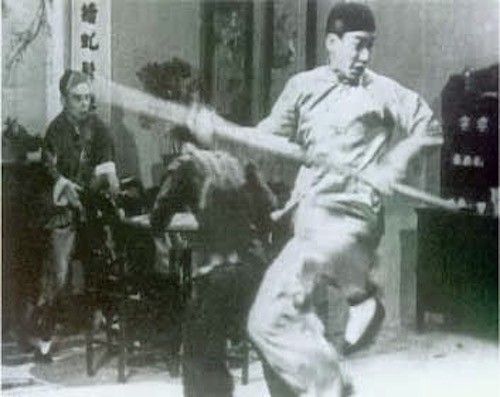The True Story of Wong Fei-hung: Whiplash Snuffs the Candle Flame (Wu Peng, 1949)

This film, released in 1949, was the first of 77 times Kwan Tak-hing played the kung fu folk hero Wong Fei-hung, kicking off a wildly successful series of serials that ran steadily for the next 15 years or so (including 25 films alone in 1956). I’ve only been able to see him in later films, homages to the serials where fans Sammo Hung and Yuen Woo-ping had him reprise his famous role in The Magnificent Butcher and Dreadnaught, respectively. Yuen’s father, Yuen Siu-tien (most famous as Jackie Chan’s Drunken Master), plays one of the villains in this film, though he wasn’t a regular in the series (Kwan’s most frequent opponent was Shih Kien, the bad guy from Enter the Dragon). Lau Cham was a frequent actor, stunt man, and choreographer on the series, and later his sons Lau Kar-wing and Lau Kar-leung worked on them as well.
I recently stumbled across this on youtube, it’s the only one of the Wong serials I’ve been able to find with English subtitles (it appears to no longer be available though). It’s in poor visual and audio quality, and the story is pretty rote. The first 30 minutes follows Wong as he rescues the wife of a local merchant from a bad guy who has kidnapped her and chained her in his basement (there are no credits, but I think this villain is Yuen Siu-tien). The second half involves a rivalry between Wong and another martial arts instructor, complicated by the heedless actions of Wong’s student Leung Foon (memorably played by Yuen Biao in Tsui Hark’s first Once Upon a Time in China). The characterization is minimal: Wong’s a stand-up guy and everyone knows it. Though there is a hilariously uncomfortable scene where he’s cornered in the bedroom of a young female admirer, the chasteness that was so essential to Jet Li and Tsui Hark’s version of the character already well-established.
What is most of interest here of course is the action. There’s a marked emphasis on performance, beginning with the opening shots of the film, a series of long takes of a lion dancer (Kwan himself) at work. In fact, the opening is very much reminiscent of the opening of Lau Kar-leung’s Martial Club, one of his Wong Fei-hung films, where, after Lau himself explains to the camera what a lion dance is, we see a long performance followed by a fight breaking out among rival groups which Wong himself breaks up. I’m almost certain Lau is calling back to this film. Regardless, the realism of the actors’ and stuntmen’s performances are constantly highlighted, with director Wu Peng opting for long takes and long shots, with very little of the cutting or zooming for emphasis that would later become kung fu movie staples, nor any of the cutting to obscure motion or impact that has always been the Hollywood standard. Throughout the film there are little asides where a performer will display some kind of technique, including some eight-diagram pole fighting, various kung fu stances, but also a long performance of a Dragon Boat song. This emphasis on realism is in stark contrast to the wuxia fantasies that had dominated the Chinese action film since the dawn of cinema. Here, in post-war Hong Kong is a new kind of action film, populated by actual practitioners of the arts, using genre film as a new means not just of showing off their skills, but passing on their knowledge and culture (specifically Southern Chinese, Cantonese culture) to the next generations. This pedagogical impulse would become a hallmark of Lau Kar-leung’s films.
There’s a remarkable shot about halfway through the film in the middle of a mass fight sequence (the choreography strikingly complex relative to the simplicity of the rest of the film) where the camera cuts to an overhead angle directly above two fighters on a balcony while at the same time slowing down the motion just enough to make the effect noticeable. Alien music rises, a Tchaikovsky piano concerto of all things, and you can imagine that, probably for the first time, someone in the audience thought, “You know, kung fu movies are kind of like musicals!”
